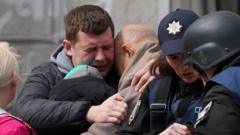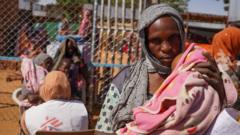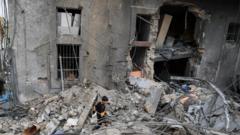Hostilities continue in Gaza as Hamas declines an Israeli ceasefire offer requiring disarmament, sparking further violence and humanitarian crises.**
Hamas Dismisses Israeli Ceasefire Offer as War Escalates**

Hamas Dismisses Israeli Ceasefire Offer as War Escalates**
Renewed conflict ensues in Gaza as Hamas rejects disarmament conditions linked to a ceasefire proposal.**
Hamas has officially rejected an Israeli ceasefire proposal that included a six-week pause in hostilities, contingent upon the armed group relinquishing its weapons. A high-ranking Palestinian official familiar with the discussions confirmed that the proposal did not guarantee any commitment toward ceasing the ongoing conflict or withdrawing Israeli troops from Gaza—essential demands of Hamas in exchange for releasing nearly half of the hostages it is currently holding.
The timing of the rejection coincides with Israel's ongoing military operations in Gaza, which have intensified tragically. Recent Israeli airstrikes resulted in the death of a security guard and injuries to nine others at a field hospital in Khan Younis. The Israel Defense Forces (IDF) have yet to comment on these developments.
According to a UN agency, the humanitarian crisis in Gaza has reached unprecedented levels since the inception of hostilities. Supplies have been blocked from entering the region for six weeks—marking the longest such cessation on record. UN officials have dismissed Israeli claims of sufficient food supplies, asserting that the blockade may violate international humanitarian laws.
Israel's Prime Minister stated that maintaining supply restrictions is a strategic move to compel Hamas to release hostages and extend the ceasefire that lapsed on 1 March. A UN office reported a significant increase in civilian casualties and the destruction of critical infrastructure in Gaza.
The official remarked that this recent ceasefire proposal relayed through Egyptian intermediaries explicitly required Hamas to disarm without offering an Israeli promise to halt military campaigns or withdraw from the region, which Hamas viewed as a non-starter.
Reports indicate that 59 hostages remain in Gaza, with 24 confirmed to be alive. Some recently released captives have recounted their grim experiences in captivity under harsh conditions. Hamas has expressed readiness to return all hostages but insists on a complete cessation of hostilities and an Israeli withdrawal from Gaza.
Despite the bleak negotiations, Egyptian officials are said to be presenting a revised ceasefire plan to Hamas for consideration. Meanwhile, analysis from Israeli media suggests that a breakthrough in ceasefire talks is not expected imminently, with a senior official indicating potential movement within the next two to three weeks, although considerable gaps remain in the negotiations.
The renewed Israeli offensive, which commenced on 18 March, has resulted in substantial casualties, with reported death tolls exceeding 51,000 over the course of 18 months of conflict. In a related incident, an Israeli airstrike struck a field hospital in al-Mawasi, resulting in a security guard's death and injuring both hospital staff and patients.
UN Secretary-General António Guterres condemned the strikes, emphasizing that such actions disrupt vital healthcare services within an already devastated system. The UN reports alarming numbers of displaced individuals in Gaza, with 400,000 refugees since the offensive resumed nearly four weeks ago.
In conjunction with worsening humanitarian conditions, opinions within Israel suggest a growing preference for a ceasefire and hostage negotiations, reflecting the public's desire to prioritize the safe return of captives over the disarmament of Hamas. However, the hardline stance of certain political factions in the Israeli government complicates the situation further, threatening stability should the conflict come to an end.
As military operations continue, Israeli reservists and veterans have begun questioning the conflict's direction, leading to increasing scrutiny over military leadership decisions and the government's commitment to equitable service among all citizen demographics.


















